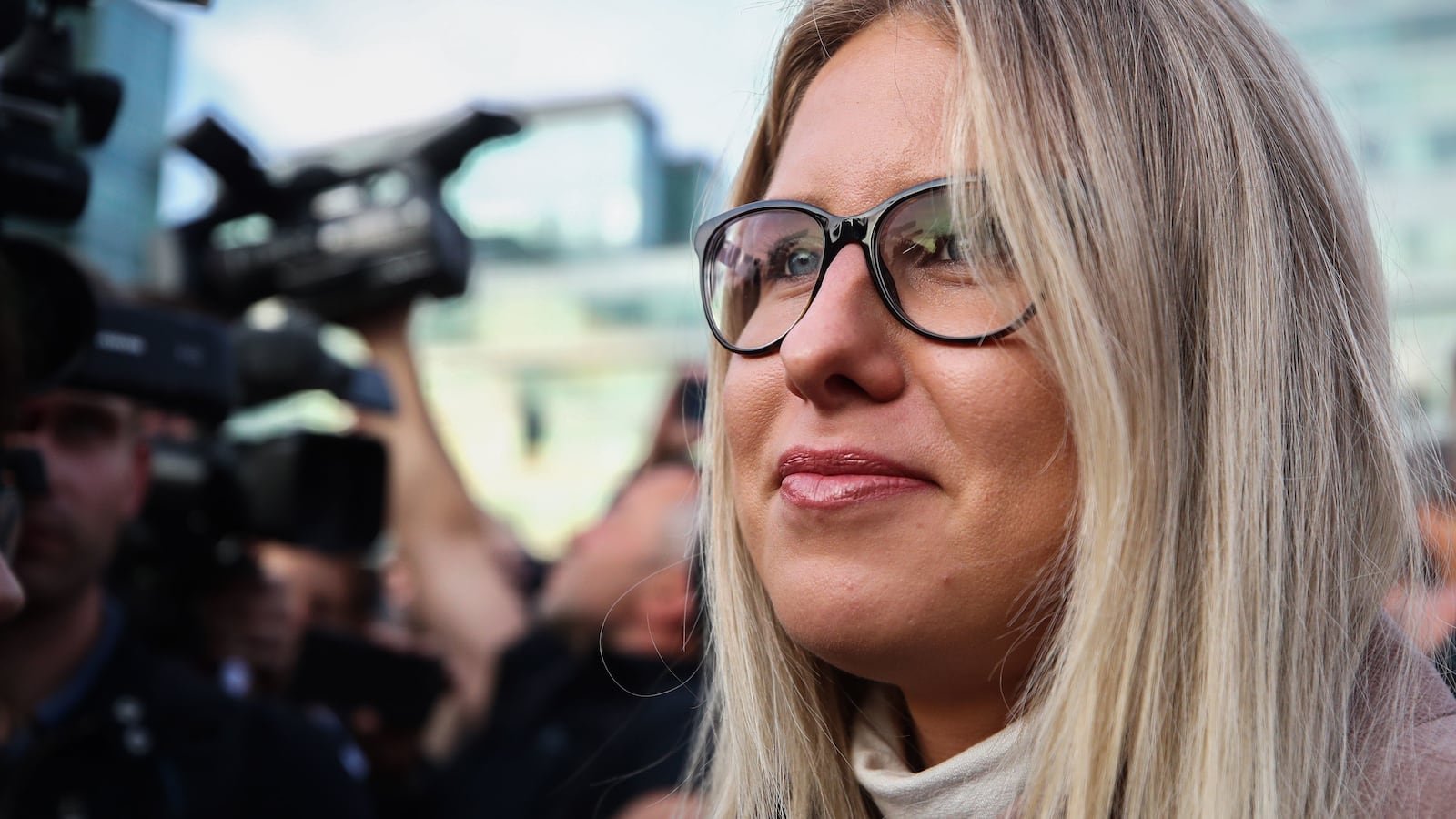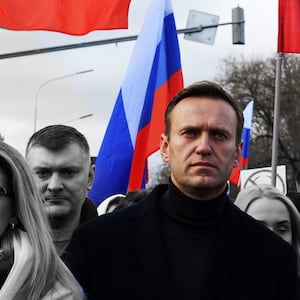MOSCOW—Tears of joy ran down Lyubov Sobol’s face when news came through that Alexei Navalny had awakened after more than two weeks in a coma. The 32-year-old blond lawyer, who cultivates a nerdy look with her dark-rimmed glasses, spent a decade fighting Russia’s state corruption at Navalny’s side. His partial recovery doesn’t make her work any less dangerous.
In an exclusive interview with The Daily Beast, Sobol revealed who she suspects of poisoning Navalny and why. With Navalny in a hospital in Berlin, Sobol is the de facto leader of the Russian opposition. In spite of the arrests, blackmail, and violent attacks, she has not left Russia, she says, because this fight is her life.
Navalny hired Sobol when she was a teenager in law school, as the first employee for his nonprofit group, the Anti-Corruption Foundation. Together they have produced dozens of video investigative reports about high-profile, outrageous cases of corruption by President Vladimir Putin’s closest allies. These reports have touched his inner circle: the petroleum kingpins Igor Sechin and Gennady Timchenko, and the Kremlin-linked catering magnate Yevgeny Prigozhin, known as “Putin’s chef.” More than 36 million people watched Navalny’s investigation into the former president and prime minister, Dmitry Medvedev, alleging he had secret real-estate holdings valued at $85 million in 2017. “We showed millions of Russians how corrupt our prime minister was and Putin replaced Medvedev, we demonstrated ex-Prosecutor General Yuriy Chaika’s corruption and Putin fired him; Putin tried to change a lot, except for himself,” Sobol said.
Putin’s opposition has suffered countless violent attacks. Activists have been jailed, tortured and assassinated; but today one man’s attacks on the group stand out, Sobol said.
“Navalny’s poisoning does not look like a Chechen attack; it has the handwriting of secret services,” she said. “Yevgeny Prigozhin, who is extremely dangerous, has the Kremlin’s license for persecutions, for murder both inside Russia and in other countries, including Africa and Syria.”
Sobol does not have any hard evidence to link Prigozhin to the attack on Navalny.
“It was wrong for Interpol to drop the extradition notice for Prigozhin. The world’s leaders should realize that Prigozhin’s hands are absolutely free now to interfere in the U.S. presidential election in November. He has millions of corrupt dollars to spend on the interference.”
Sobol says Prigozhin once attacked her family: Somebody stabbed her husband, a sociologist, Sergei Mokhov, with a syringe. The attacker injected a cocktail of chemicals that made him lose consciousness. “Poisonings are Prigozhin’s style, he waited for two months after our very popular investigation into his financial schemes—more than four million people watched it. Then, he conducted an attack on my husband,” Sobol said.
Prigozhin is not known to be under investigation for any crime in Russia and his company has sued Navalny’s group for slander related to other accusations.
“If not for the quick ambulance pickup and the hospital around the corner from our house, my husband would have been dead,” Sobol said.
Protests are all but banned in Russia. People who gather in the street are punished with high fines and time behind bars. Putin regularly talks about the West financing Russian opposition: “Countries that conduct an independent policy or that simply stand in the way of somebody’s interests get destabilized,” he said in 2014.
Some voices in Russia’s liberal circles say it’s time for a female leader to take on Putin.
Yulia Navalny, whose prominence has risen since she took control of the situation when her husband was poisoned, is one potential candidate. Sobol is another.
“Women’s rights, gender equality become acute issues on Russia’s agenda. People feel a lot of sympathy and support for Navalny’s wife Yulia, who managed to win the battle with authorities, demonstrate incredible courage, and move her husband to Germany,” Alisa Ganiyeva, an influential member of Moscow’s literary circles, told The Daily Beast. “And Lyubov Sobol is a vivid example of a woman’s significant transformation from a lawyer, an assistant into an independent political figure and influencer.”
Navalny’s family is now with him in Germany, where doctors believe Putin’s nemesis has been poisoned with the military-grade Novichok nerve agent.
While he recovers in hospital, the political battles around Navalny’s poisoning continue. The U.S. House Foreign Affairs Committee is calling for President Trump to investigate Navalny’s poisoning. German Chancellor Angela Merkel is demanding Russian authorities “investigate this crime to the last detail and do so in full transparency.”
Before the poisoning, French President Emmanuel Macron was planning to reset relations with the Kremlin and visit Moscow. Those plans are now reportedly under threat.
Moscow denies there was a poisoning and the foreign ministry has complained about Germany’s “unfounded allegations and ultimatums.”
In the future, Sobol thinks, Russia should move away from having a single all-powerful leader. “It is important to understand that both Russians and Belarusians are tired of authoritarian leaders. People organize protests and movements on the horizontal level,” she said. “Only this summer, we saw giant rallies in the Russian Far East, in Khabarovsk and in Bashkiria—activists realized that their leaders get arrested or attacked, so communities organize, communicate on social media, and plan strategies and rallies.”
Police often raid Navalny’s anti-corruption group, and confiscate office and film equipment. Sobol says she spends all her spare money on fines for organizing rallies. She and her colleagues get arrested every few months, and now they have seen their boss attacked with a chemical weapon.
And yet still Sobol stepped forward to fill Navalny’s position as the face of the opposition. “We, Navalny’s team, are like water: They squash us in Moscow, we open headquarters all across Russia. They arrest some of us, others immediately fill the gaps,” Sobol said.
“I am never going to escape abroad—people recognize me in the streets. I am in charge of YouTube channels watched by more than six million people. And I am planning to run for Parliament next year.”






